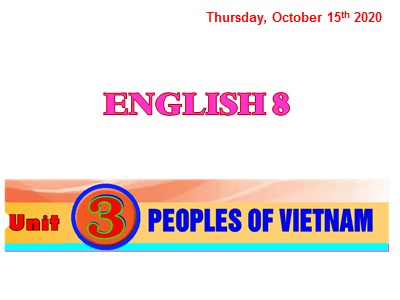Bài giảng Tiếng anh Lớp 8 - Unit 3, Lesson 2: A Closer Look 1 - Năm học 2020-2021

- major /ˈmeɪ dʒə(r)/ (a)
- (in)significant /sɪɡˈnɪfɪkənt/(a)
complicated /ˈkɒmplɪkeɪtɪd/(a)
basic /ˈbeɪsik/ (a)
traditional /trəˈdɪʃənl/ (a)
boarding school /ˈbɔːdɪŋ sku:l /(n)
2. Use some words from 1 to complete the
sentences.
1. Many ethnic groups have their own languages, and some even have _________ languages.
2. People in some far-away mountainous regions still keep their __________ way of life.
3. Gathering and hunting still play a(n) _________ role in the economy of the Laha.
4. Ethnic peoples in the mountains have a ________ way of farming. They use _________ tools to do the farm work.
5. The Muong in Hoa Binh and Thanh Hoa are well-known for their _________ folk literature and their traditional songs.
Thursday, October 15th 2020ENGLISH 8WARM-UP:Choose the right phrase and then put it under the appropriate picture. musical instrumentopen-air marketterraced field costumestilt housewater festivalNew lessonsUNIT 3: PEOPLES OF VIET NAM LESSON 2: A CLOSER LOOK 1VOCABULARY - major /ˈmeɪ dʒə(r)/ (a)- (in)significant /sɪɡˈnɪfɪkənt/(a)complicated /ˈkɒmplɪkeɪtɪd/(a)basic /ˈbeɪsik/ (a)traditional /trəˈdɪʃənl/ (a)boarding school /ˈbɔːdɪŋ sku:l /(n) minor= (not) important simple= not developed- truyền thống- trường nội trúThursday, October 15th 2020CHECKING VOCABULARY - major /ˈmeɪ dʒə(r)/ (a)- (in)significant /sɪɡˈnɪfɪkənt/(a)complicated /ˈkɒmplɪkeɪtɪd/(a)basic /ˈbeɪsik/ (a)traditional /trəˈdɪʃənl/ (a)boarding school /ˈbɔːdɪŋ sku:l /(n) minor= (not) important simple= not developed- truyền thống- trường nội trúThursday, October 15th 20201. major2. simple3. modern4. spoken5. richa. writtenb. insignificantc. complicatedd. minore. basic1. Match the adjectives in A with their opposites in B.6. developf. poor7. importantg. tradition2. Use some words from 1 to complete the sentences.people friendly, brave, boring, nomadic, colourfullife slow, hard, boring, inconvenient, peaceful, nomadic, colourfulscenery colourful, vast, peaceful 1. Many ethnic groups have their own languages, and some even have _________ languages.2. People in some far-away mountainous regions still keep their __________ way of life.3. Gathering and hunting still play a(n) _________ role in the economy of the Laha.4. Ethnic peoples in the mountains have a ________ way of farming. They use _________ tools to do the farm work.5. The Muong in Hoa Binh and Thanh Hoa are well-known for their _________ folk literature and their traditional songs.richwrittentraditionalimportantsimplebasic3. Work in pairs. Discuss what the word is for each picture. The first and last letters of each word are given.1. c_______y 2. p_____a 3. t_____e4. w_________l 5. s____l 6. b_____teremonagodemplaterwheehawaskein the northLy Sonof the Thai women of the Sedang4. Listen and repeat the following words.Pronunciation: Clusters: /sk/, /sp/ and /st/ skateboard stamp speechdisplay first stationinstead crisp schoolbasket space task 5. Listen again and put them in the right column according to their sounds. /sk//sp//st/ taskschoolstationspeechspacecrispfirststampskateboarddisplayinsteadbasket1. The Hmong people I met in Sa Pa speak English very well.2. You should go out to play instead of staying here.3. This local speciality is not very spicy.4. Many ethnic minority students are studying at boarding schools.5. Most children in far-away villages can get some schooling. 6. Listen and read the following sentences. Then underline the words with the sounds /sk/, /sp/, or /st/. speakinsteadstayingspecialityspicystudentsstudyingschoolsMostschooling+ HOMEWORK - Learn the new words by heart.- Practice pronunciation “sk”, “sp” “st” again.- Do exercises A 1, 2 in workbook (page 16).- Prepare for Unit 3: Closer look 2.Goodbye!See you again!THANKS FOR YOUR ATTENTION!
Tài liệu đính kèm:
 bai_giang_tieng_anh_lop_8_unit_3_lesson_2_a_closer_look_1_na.pptx
bai_giang_tieng_anh_lop_8_unit_3_lesson_2_a_closer_look_1_na.pptx



